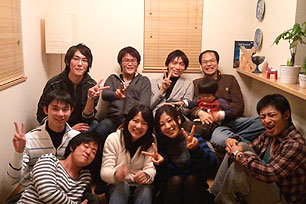Eisaku Ide, Associate Professor, Faculty of Economics
The attraction of fiscal sociology lies in recognizing the beginnings of social change through the relationship between fiscal administration and society
Eisaku Ide

BA from the Faculty of Economics, University of Tokyo in March 1995. Withdrawal from the Doctoral Program with the completion of course requirements, University of Tokyo in September 2000.
Visiting scholar, Institute for Monetary and Economic Studies, Bank of Japan in May 2000 - March 2001. Served as Research Assistant in the Faculty of Economics at Tohoku Gakuin University, Associate Professor in the International Graduate School of Social Sciences of Yokohama National University, and taught at the University of Colorado at Boulder before joining the Faculty of Economics at Keio University in April 2009. Publications include Takahashi zaisei no kenkyu: Showa kyoko kara no dasshutsu to zaisei saiken e no kuto (“A Study on the Takahashi Economic Policy”), Kokyo suru shakai: ‘Jiritsu to chowa’ no seiji keizaigaku (“Creating a Harmonious Society: Political Economy of Social Configuration”) (co-editor) and Kibo no koso: Bunken – shakai hosho – zaisei kaikaku no totaru puran (“Design for New Fiscal Policy – A Total Plan for Fiscal Decentralization, Social Security and Fiscal Reform”) (co-editor)
Fiscal research on the 1930s as a starting point
─ What made you want to pursue research in fiscal sociology?
Economics, as a discipline, generally sets out to construct theories on the premise that “humans seek to maximize their own profit”. But I felt that society should be something created when people who share the same values and the same destiny come together, rather than simply being a conglomeration of individuals seeking to pursue their own interests; I wanted to consider economics and people from a slightly different perspective.
When I started graduate school, I read The Crisis of the Tax State, a book on fiscal sociology by Austrian economist Joseph Schumpeter, and thought “This is interesting”. The Crisis of the Tax State is now regarded as a basic text on fiscal sociology. In it, Schumpeter reflects on Austria’s predicament with its unprecedented accumulation of public debt after defeat in the First World War, and attempts to grasp the essence, format and destiny of the state from the viewpoint of fiscal administration.
─ Could you briefly explain what fiscal sociology is?
Fiscal studies, or the science of public finance, is a discipline that focuses on the basic principles whereby a government levies taxes from its public and decides how to use them. This is a question of government policy, but when discussing policy, it is essential to analyze, among other things, how the theory of the beneficiary public is reflected in policy measures, and what changes in society will occur as a result of the policy. Fiscal sociology, on the other hand, is a historical analysis of reciprocity and interaction between the government and the public in such cases, as well as the dynamics of the impact of policy on social change. Fiscal sociology sets out to grasp, in their entirety, the politics, economy and society that form our world. It enables us to interpret changes in fiscal phenomena and thereby understand the beginnings of social change; this could be seen as its major attraction.
─ What kind of research have you been involved in, specifically?
Since moving up to graduate school, my main focus has been on the history of fiscal administration since the 1930s. Korekiyo Takahashi, Finance Minister at the time, set out a policy of positive fiscal administration, changing from the gold standard to a system of managed currency, whereby the amount of currency issued could be controlled by the monetary authorities. Now the government could freely procure military expenditure by having the Bank of Japan underwrite national bonds. The prevailing view is that this set Japan on the path to subsequent war with China and involvement in the Second World War, turning Japan into a militarist nation.
What is important here, however, is not only that Takahashi’s fiscal administration led to war, but also that the system of fiscal administration formed between Takahashi’s time and the postwar occupation also remained intact after the war. When the system functioned well, it led to high-level economic growth in which the national income doubled. But when it ran counter to social needs, it caused strong public resistance to taxation, or a mistrust of society and government. The result is the unprecedented fiscal deficit of today.
By drawing on primary materials to delve deeper into the policymaking process during the Takahashi fiscal administration, the war years and the occupation, we start to see undercurrents in Japanese society that continue to the present day. Research on fiscal history is the basis of fiscal sociology; it has importance as research that investigates the origin of Japan’s fiscal afflictions in the modern day. In a sense, I think it can be seen as a very contemporary theme.
The problem is that the public does not see a link between tax and public services

─ From the viewpoint of an expert in fiscal sociology, where do you think the problems of today’s fiscal administration lie?
The Japanese government today is burdened by a massive fiscal deficit, and most people seem to think this results from wasteful spending by the government. As such, they want wasteful spending to be reduced as far as possible, even under the current regime, as illustrated by the screening of government projects. However, Japan’s government is the smallest of all leading industrialized nations, and it is clearly misleading to say that its expenditure is excessive. The biggest reason for the fiscal deficit is a shortfall in tax revenues.
So why are tax revenues no longer adequate? Why do people feel a lot of government spending to be wasteful? It’s because the public do not agree with the way their taxes are used. In other words, most members of the public feel that the taxes they pay are not rewarded by a satisfactory level of public services.
For example, more women today go out to work, and childcare is no longer the sole domain of the home. As a result, women want nursery facilities that will allow them to work in reassurance. Again, Japan is now a rapidly aging society, and our senior citizens want better care services. However, the government has pushed through economic measures with priority on public works, and has merely kept reducing the scale of finances that were already small. This is no way to reassure the public that their taxes are well spent. The root of the problem lies in the fact that the government is gradually losing sight of the essence of fiscal administration, i.e. “collaborative fulfillment of shared demand”.
─ How have we fallen into this predicament?
Well, for a long time after the war, the system of levying taxes and redistributing the revenues worked well, and the public felt a degree of trust in the government. Up to about the mid-70s, middle earners and small enterprises enjoyed big tax cuts, while low earners and rural areas were provided with employment by investing tax revenues in public works. As a result, there was not such a big sense of resistance to paying taxes.
After that, the government continued to adopt this kind of policy, but in spite of the huge social changes from the 1990s onwards, it pushed this old-style system to extremes. This resulted in large-scale public works and massive tax reductions. But the repeated tax cuts gave rise to a fiscal deficit, and now that method has reached its limit. In the 1990s, the political majority shifted to middle earners and the urban electorate, and there is now growing opposition to public works. Japan’s fiscal system has not kept pace with social change and has strengthened public opposition to it.
─ So how can we get out of this situation?
I think we need to make a clear distinction between the essence and roles of government and society, and create a system in which the necessary services can be properly provided. It is the duty of the state to guarantee the people’s survival and right to live. Since placing a heavy tax burden on the poor runs counter to this basic principle, the government should build a tax system based on the key elements of progressive income tax, corporation tax and inheritance tax. To achieve this goal, the acceptance of middle earners and affluent classes will be needed. And to this end, we must promote policies that will benefit middle earners. People who are not worried about simple survival need livelihood security. Measures and services to this end are not borne by the central government, but by the local authorities that are more closely linked to our everyday lives.
In other words, we need to radically change the model of national fiscal administration. Rather than the idea of gathering money centrally and redistributing it locally, we need to enhance local fiscal administration, enabling local authorities to pursue policies that will satisfy the livelihoods of their citizens. A key element here is consumption tax. Although the talk at the moment is all about how far to raise consumption tax as a national tax, we should think of consumption tax as a local tax. Life security needs are enormous. Since consumption tax places an equal burden on all citizens, the tax rate remains low. It should be made into a key tax together with local resident’s tax.
─ If local consumption tax could be levied, what would be the best way of using it?
To meet living needs, the fiscal resources of all local authorities would be bumped up by local consumption tax. Then, as for the necessary services, the citizens would demand that their burden of resident’s tax be used for their own subsistence, and local authorities would have to respond to those demands. Because, unlike the national government, local governments can gain a specific, real grasp of local needs and ways of using tax. If the money is used to fund nursery facilities for children, care services for the elderly or such like, the citizens would accept this and be happy to pay their taxes.
Promoting this kind of locally derived policy will, I think, boost motivation towards social participation and restore trust in politics and fiscal administration. As a result, it will also make it possible to redistribute funds through national taxes.
Grasping the flow of Japanese society to the present, from the viewpoint of fiscal sociology

─ What do you think it will take to revive the Japanese economy?
We’re now in a phase of declining economic growth, and the wages of working people are not rising. As a result, consumption is stagnant and Japan as a whole has no energy. The first thing will be to raise the labor distribution ratio, or in other words increase wages and stimulate consumption activity. Elderly people today have significant savings, but are reluctant to use their money out of anxiety over their subsistence. This is holding up the flow of money. Young people may be more willing to spend money but their consumption desires are not satisfied, owing to the low labor distribution ratio. If this continues, there is no way that the economy will pick up and the nation will regain its energy.
We need to make bold institutional changes. European countries have high tax burdens but well-developed systems for nurseries and other childcare facilities, welfare facilities for the elderly, and so on, and economic growth is being sustained as well. Japan enjoyed economic growth after the war, and the public has come to believe the “myth of growth”. As a result, there may be some resistance to changing course to this kind of welfare state. However, if there is no hope of economic growth as we have seen in the past, I think we in Japan should aim for a society in which we can support lives without insisting on economic growth.
This means parting ways with a society in which people are classified according to wealth. A society that properly guarantees the subsistence of its people is a society that treats all kinds of people equally, whether high, middle or low earners. A society that only aids the poor and aims for economic equality will hit a dead end. Japan and America are classic examples of this. But if the state adopts the stance of not classifying people according to wealth, attitudes to the country and society will change. People will start to trust others, and will also show an understanding of the need to pay tax. And then, as a result, I think this will become a society in which “generosity” towards the more vulnerable elements will become manifest, a society in which it will be possible to achieve proper redistribution of incomes. “All for all” is the basic principle of fiscal administration.
─ So your message is that understanding fiscal administration requires a total grasp of politics, economy and society.
It is human beings who engage in economic activity, and human beings who comprise society. How we view society is how we view human beings. Fiscal sociology could be described as a discipline that understands people and watches over the societies created by them.
─ What issues will you take up in future?
I intend to make a comprehensive appraisal of Japanese society from the Takahashi fiscal administration in the 1930s, as I mentioned earlier, to the present day, from the viewpoint of fiscal sociology.
*This article appeared in "Kenkyu Saizensen" (Apr. 15, 2011) of Keio University Japanese Website.
